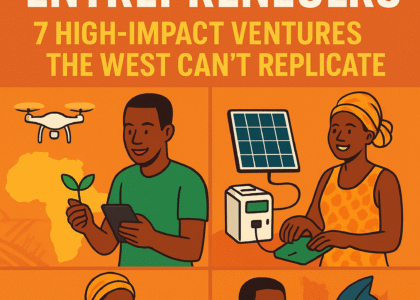Introduction
In April 2019, the world turned its attention to Africa when Jumia, an e-commerce platform often referred to as the “Amazon of Africa,” achieved a historic milestone. It became the first African startup to list on the New York Stock Exchange (NYSE). This event was not just financially significant; it demonstrated to the global investment community that Africa’s entrepreneurs were ready to compete on a worldwide scale.
Jumia’s IPO was more than a business achievement; it inspired many. It highlighted that Africa’s economic growth depends not on foreign aid or extraction industries but on entrepreneurs willing to dream big, solve problems, and create scalable solutions for the continent.
In this blog, we will explore how Jumia’s IPO became a turning point, what it means for Africa’s economic growth, and why entrepreneurs—from Lagos to Nairobi and from Accra to Cape Town—hold the keys to the continent’s future.
The Story of Jumia’s Rise
Jumia was founded in 2012 by Sacha Poignonnec and Jeremy Hodara, former McKinsey consultants, with a bold vision to build Africa’s leading e-commerce platform. Starting in Nigeria, Jumia expanded into various African countries, tackling complex challenges like logistics, payment systems, and infrastructure gaps.
By 2016, Jumia had already become Africa’s first tech startup to reach “unicorn” status with a valuation of over $1 billion. When it listed on the NYSE in 2019, it raised about $196 million, making it the first African-born startup to ring the bell on Wall Street.
Key Lessons from Jumia’s Journey
- Big Dreams Matter: The founders thought globally, not just locally. IPOs are for companies aiming to grow beyond borders.
- Resilience in Complexity: Jumia faced fraud, operational challenges, and trust issues, yet it remained committed.
- Symbolism Counts: Even with its rocky path, Jumia stands as a beacon, proving that global investors are ready to take Africa seriously.
Why Jumia’s IPO Matters for Africa
The IPO was historic because it broke mental and financial barriers. Here’s why it matters:
Global Visibility: Investors in New York and London could no longer overlook Africa’s entrepreneurial potential.
Validation of the Ecosystem: It demonstrated that African startups can attract top-tier investment and meet international corporate governance standards.
Psychological Shift: It encouraged a new generation of African entrepreneurs to think beyond mere survival and towards growth.
The most important aspect is symbolic: Africa’s growth lies in the hands of its builders.
Africa’s Economic Growth Depends on Entrepreneurs
Africa has the youngest population in the world, with over 60% of people under 25. By 2050, the continent will have nearly a quarter of the global population. This demographic shift brings both opportunities and risks.
Why Entrepreneurship is Crucial
- Job Creation: Africa needs 20 million new jobs each year. Governments alone cannot provide them; entrepreneurs will.
- Innovation for African Problems: From mobile payments to health tech, local founders understand and can address local issues better than anyone else.
- Economic Independence: Building African giants reduces reliance on imports and foreign aid.
Entrepreneurs drive growth. Without them, the continent risks unemployment, unrest, and stagnation. With them, Africa can leap into the digital economy.
The Next Wave of African Builders
Jumia may have been first, but it certainly won’t be the last. Several African startups have already made headlines:
Flutterwave (Nigeria): A fintech unicorn that simplifies payments across Africa.
Andela (Nigeria/Uganda/Kenya): Training African software developers for the global market.
Paystack (Nigeria): Acquired by Stripe for $200 million in 2020.
M-Pesa (Kenya): Revolutionized mobile money and financial inclusion.
Chipper Cash (Uganda/Ghana): Expanding cross-border payments.
These startups showcase the diversity of African entrepreneurship, spanning e-commerce, fintech, health tech, agri-tech, and logistics.
Challenges Facing African Entrepreneurs
While opportunities are vast, Africa’s entrepreneurs still face significant hurdles:
- Infrastructure Gaps: Poor roads, unreliable electricity, and limited internet access.
- Regulatory Uncertainty: Sudden policy changes deter innovation.
- Funding Gaps: While venture capital is increasing, it remains well below what’s needed.
- Talent Shortages: Brain drain continues to be a challenge.
History shows that challenges often lead to the most innovative solutions. For instance, unreliable banks gave rise to mobile money, and poor healthcare infrastructure is fueling health-tech startups.
How Africans Can Build the Future
- Mindset Shift: Africans must view entrepreneurship as a noble path to nation-building, not just a fallback option.
- Collaboration Over Competition: The continent is too vast for single players. Partnerships across borders can create more opportunities.
- Policy Support: Governments must encourage startup growth by reducing bureaucracy, supporting innovation hubs, and investing in digital infrastructure.
- Culture of Risk-Taking: Failure should not carry stigma. Each failed startup teaches valuable lessons for the ecosystem.
- Building for Scale: Entrepreneurs need to think on a continental scale rather than just a local one.
The Africa Builders’ Call to Action
At The Africa Builders, we believe entrepreneurship is more than profits. It’s about laying the groundwork for Africa’s future. Every African entrepreneur is a nation-builder, responsible for creating jobs, inspiring communities, and proving that Africa is more than its challenges.
Jumia’s IPO showed the world what is possible. Now, it is our role to multiply these success stories across industries, borders, and generations.
If Africa is to grow, it will rely on its entrepreneurs.
Frequently Asked Questions (FAQ)
- Why was Jumia’s IPO important for Africa? It was the first African startup to list on the NYSE, providing global visibility to African entrepreneurship and inspiring the ecosystem.
- Is Jumia still successful today? Jumia has faced ups and downs, including financial losses and restructuring, but its IPO remains a historic milestone that proved African startups can compete globally.
- How does entrepreneurship help Africa’s economy? Entrepreneurs create jobs, innovate solutions for African problems, attract investment, and reduce reliance on foreign aid.
- Which African startups are currently thriving? Notable ones include Flutterwave, Paystack, Andela, Chipper Cash, and M-Pesa.
- What challenges do African entrepreneurs face? They encounter infrastructure gaps, funding shortages, regulatory uncertainty, and talent drain.
- Do African governments support entrepreneurship? Support varies by country, but many governments are starting to create innovation hubs, reduce bureaucracy, and invest in tech infrastructure.
- What can young Africans do to become entrepreneurs? They can begin by identifying local problems, learning digital skills, seeking mentors, and fostering a mindset for growth.
- What role does The Africa Builders play? The Africa Builders aims to inspire, mentor, and showcase African entrepreneurs, emphasizing their central role in the continent’s future.
Conclusion
Jumia’s IPO was not the conclusion of a story, but the start of a movement. It showed that Africa’s moment is now, and its future rests on the courage of entrepreneurs who dare to build.
The path is challenging but achievable. For Africa to prosper, its entrepreneurs must dream big, persist, and work together. At The Africa Builders, we believe that every startup founded, every solution created, and every job generated brings Africa closer to prosperity.
Africa will rise on the strength of its entrepreneurs.





